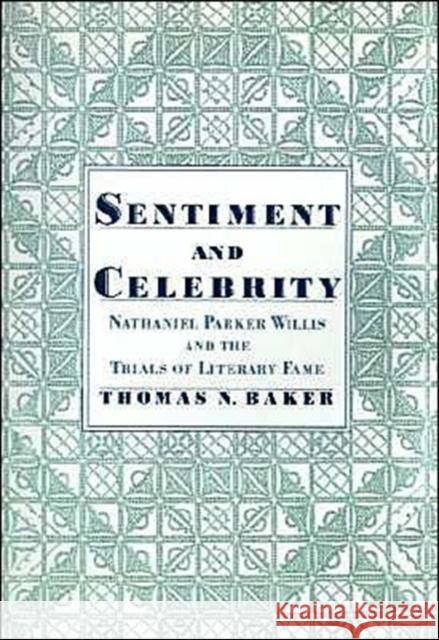Sentiment & Celebrity: Nathaniel Parker Willis and the Trials of Literary Fame » książka
Sentiment & Celebrity: Nathaniel Parker Willis and the Trials of Literary Fame
ISBN-13: 9780195120738 / Angielski / Twarda / 1998 / 272 str.
Sentiment & Celebrity: Nathaniel Parker Willis and the Trials of Literary Fame
ISBN-13: 9780195120738 / Angielski / Twarda / 1998 / 272 str.
(netto: 519,95 VAT: 5%)
Najniższa cena z 30 dni: 534,67
ok. 30 dni roboczych
Bez gwarancji dostawy przed świętami
Darmowa dostawa!
How did the stately, republican literary world of Washington Irving and James Fenimore Cooper give way to the sensationalist, personality-saturated mass market society of the late nineteenth century? In answering this question, Sentiment and Celebrity tells the story of a man the New York Times once called "the most talked-about author in America." A widely admired, if controversial, master of the sentimental appeal, poet and "magazinist" Nathaniel Parker Willis (1806-1867) was a pioneer in the modern business of celebrity. In his heyday, he knew both popularity and success as few other American writers had. Willis, who became the gossip-dishing darling of the middle class and whose sister was the popular writer Fanny Fern (of Ruth Hall fame), was a shrewdly self-styled man of letters who attained international fame by publicizing the renowned figures of the day, including himself, and by playing to, or playing upon, the sentimental desires of his readers. By the 1840s, he could count himself among the nation's highest paid writers and most influential arbiters of fashion and feeling (especially with genteel women), though he could also describe himself, accurately enough, as one of the "best abused" literary men of his generation. With fame and self-promotion came unexpected, perhaps unforeseeable, burdens, and scandal followed eventually.
By charting the various controversies that surrounded Willis, this book shows how the cultural and commercial impulses that fostered antebellum America's new love of fame and fashion drew sustenance from the concurrent allure of genteel cultivation and sentiment. Still, perennial tensions between desires for privacy and the invasive impulses of publicity, and between desires for sincerity and the appeal of social and commercial artifice, rendered this cultural conjunction highly unstable. Readers of Willis were both attracted to and disturbed by his written work and his very person; he introduced new possibilities for fashion, taste, and celebrity, and these new modes of thought and emotion were at once enchanting and unsettling. Because this cultural instability and the impulses that spawned it cut across a number of discourses, and because, in many ways, this double-edged quality remains central to our modern celebrity culture, Sentiment and Celebrity will appeal to students and scholars of several disciplines, among them literary studies, women's studies, sociocultural history, and communication studies. As Thomas N. Baker demonstrates in these fascinating pages, not only does Willis's story enrich our understanding of the early history of celebrity and the development of this country's literary marketplace in the years before the Civil War, it also shows how the cultural phenomena of sentiment and celebrity have gone hand in hand since their inception. Given the countless ways in which fame (literary or otherwise) continues to pervade (and pervert) the American Dream, Baker's book is a "life and times" study that speaks directly to our own lives.










